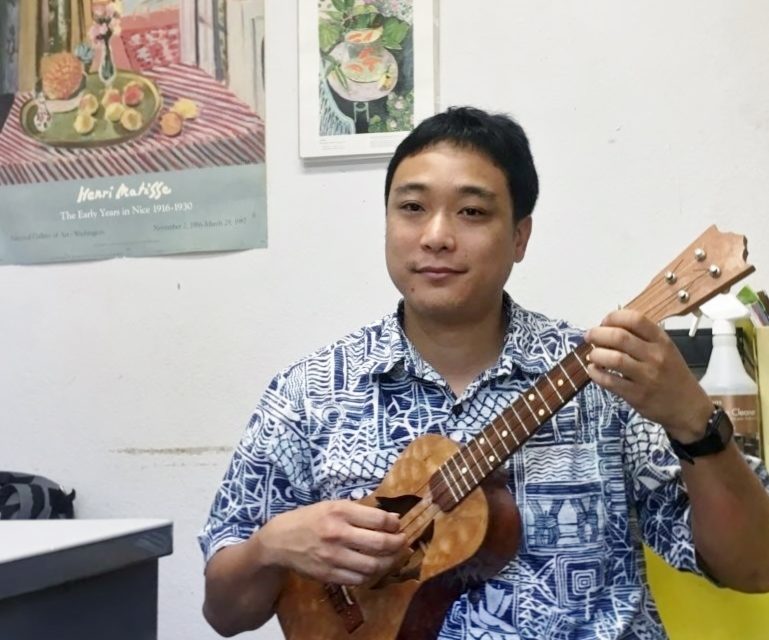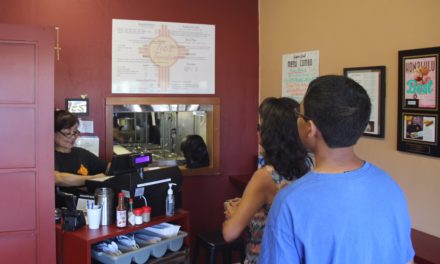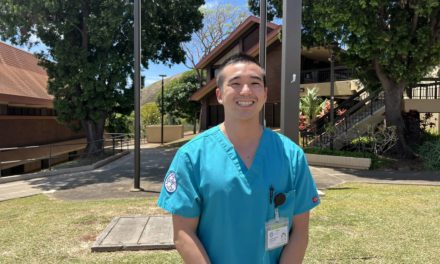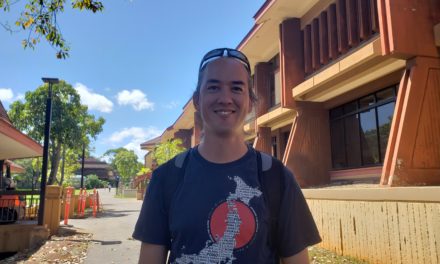By Katlin Cilliers | Staff Writer
Ask a Professor is a regular feature where Kapiʻo News will highlight the real-life careers and jobs that stem from areas of study at Kapiʻolani Community College.
Jacob Koseki’s career as a music therapist has taken him around America and given him the chance to work with diverse demographics. He is currently a board certified music therapist, and obtained a master’s in guitar performance from Arizona State University in 2010. He currently teaches MUS 170 – music as therapy – at Kapi‘olani Community College.
What is music therapy?
In a few words, I guess music therapy, we use music, so there’s people who go to school to become music therapists, and what it does is it trains them to be able to work with people who might have any type of condition, any type of disability. And using music as the medium, we’re going to try to achieve non-musical goals.
What kind of non-musical goals?
More practical goals, like speech goals, learning how to speak. … Say a person has had a stroke. So, they have aphasia, which is the loss of language – either reading, speaking or both – and so maybe we might do things like melodic intonation therapy, which is basically just singing on different pitches and different rhythms. And because it mimics speech, they’re able to eliminate the stutter in their speech, they’re able to speak clearer, to speak louder.
Can you give more examples of non-musical goals?
Maybe [with] Parkinson’s they have a gate problem, so their pattern of movement isn’t quite there, and so what we do is we just give them like a really hard beat to walk on, like a [guitar sounds in marked beats]. And they’ll shuffle to that, move to that. Yeah, like physically moving. Like playing while they’re physically moving. And if you YouTube RAS [Rhythmic Auditory Stimulation], you’ll see examples of people in hospitals doing that exact same thing. And it’ll show them trying to walk without the musical cue and with the musical cue, and they’re in training and matching their body movements to it, and then you take away the music, and they can still do it.
How do you become a music therapist?
Right now, Hawai‘i doesn’t have a music therapy program, so in order to get a degree or to get board certified, you would have to go one of the AMT [American Music Therapy Association] schools. … They’re all over the country and in other countries as well, but yes, you would have to leave Hawai‘i to do that. So what I can do here with my class is get people hooked, kinda get them into it.
Do you need to start already knowing how to play?
You do have to be a musician to be a music therapist. And it’s your relationship with music that shapes your therapy.
Where can someone with a music therapy degree work in?
The cool thing about it is that as a music therapist, you’re not limited to one type of population. So you’re not limited to just children. You can choose to just work in a specific area, but what I love about it is the diversity, so it can be anywhere from schools, to clinics, to hospitals, to private homes but even unique places where you’d never think you might be.
I used to work with children with cancer, in the pediatric oncology unit. I’ll go in and see what their needs are, and generally it would be social, emotional type of skills. I want them to smile. I want them to laugh for the first time, if they hadn’t laughed or smiled in six months, … they’re in a lot of pain, a lot of discomfort. With things like music therapy … one of the documented positive outcomes of it is they get out of the hospital faster, they’re not needing to take as many pharmaceutical drugs.
What’s the link between music and children with special needs?
I like working with children a lot. I like working with children with autism for quite a bit, in their social and communication goals. For instance, typically children with autism, there could be deficits in a number of areas but one of them tends to be communication. Music, being such a great nonverbal form of communication and because it requires so much attention to detail, we can formulate groups and set up, maybe a child with autism who has difficulty engaging interacting with others. I can set them up in a music group where they’re going to be successful by singing to a friend, by making eye contact with a friend. Or it could be as simple as beginning with maybe they’ll just even sit down and not throw a tantrum for a while, in front of a musical instrument. Maybe they’ll vocalize and match the pitch of what I’m doing as their first step towards learning how to use their voice.
What does the job market look like?
It can vary between, I’d say on the low end, I’ve seen statistics ranging from about $30,000 a year, all the way up to, maybe, let’s say … $70- to $80,000 a year.
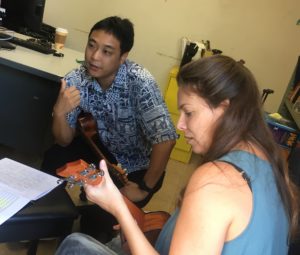
“It’s your relationship with music that shapes your therapy,” Jacob Koseki said. (Photo by Katlin Cilliers)
How was your internship experience?
So, my population was children in placement, meaning, teenagers from all over, basically a residential facility. They were taken away from their parents either because they had none, or they’re being abused. Everyone over there had been abused, had abuse problems, or issues. The population is called “at risk”, “at-risk” teens, and for me it was eye-opening and yeah, they had tougher lives than I’d ever had. I’d read their files and it would just make you wanna cry when you realize how they grew up. Children watching, as children watching their parents overdose on drugs, children being sexually abused by their own parents, just horrific things and to be in that kind of environment on a 24-hour basis, doing groups where we’re doing music but especially, it’s psychosocial. We’d try give them a routine. One of group was focused on singing, where we’d practice, then we’d perform in church. It could even be primarily just social. A lot of it it’s just stability, just to stabilize them. How do you do that? Making music, pretty much.
Do you have any memories that stand out?
One boy that I was assigned to, there were some kids I was assigned to work with, to be “my kids.” … He was very much a young kid still, about 14, he was very much shy, by nature, really quiet, hard time with self-esteem from things like sexual abuse and … I taught him a little bit of classical piano. So we played Bach and he performed it in one of our little gatherings, we’d put little shows. And he did good and well. Doing what we’re doing, the other kids could’ve ripped on him, but they actually [said] “Hey, good job. That was cool, man. That was neat.” And it was a good experience for someone like that, because he was so smart, so bright, so intelligent.
What traits are needed to thrive as a music therapist?
It’s typically a music student who is quite talented in music but has found that music performing isn’t what they thought it was, or it’s not enough, it’s not making a connection that they thought. Typically in performance, there’s a disconnect. You might connect with the audience for a bit, and then you’re very much on your own. A lot of great performers have given up on the stage and became music therapists. And when asked, they say, “I don’t really feel like I’ve given up anything.”
You have to have a personality where you’re going to be uncomfortable and on the spot and you gotta be able to think on the fly. You can’t be too embarrassed about things when things don’t go exactly as you planned.
[To read previous Ask a Professor features, click here.]

